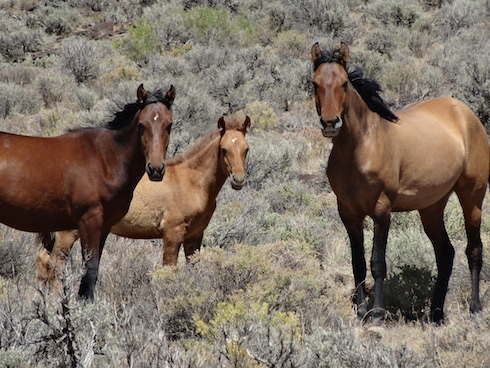Tonic of Wildness
Poems by Barbara March

Photo by Helen Valborg
Author’s Note: Forty-two years ago President Richard M. Nixon borrowed from Thoreau when he signed the Wild Free-Roaming Horses and Burros Act. “We need the tonic of wildness,” Nixon said quoting Walden, adding that he took “special pleasure...signing strong legislation to protect these noble animals.”
Today there are more mustangs (or feral horses as they’re now called by the federal government) in captivity than there are running free. Over 50,000 wild horses are stockpiled at taxpayer expense in Bureau of Land Management holding facilities in the Midwest to prevent them, as the BLM postulates, from over-running the public range and competing with private permitted grazers. We’re told that these government holding facilities are filled to capacity.
Wild horse roundups, or BLM “gathers” as they’re euphemistically called, have been temporarily suspended. But the horses are adapted survivors and their numbers continue to grow. Inevitably, helicopters will again take to the air to run horses to exhaustion, to push and prod foals to the trap.
This inhumane treatment and waste of taxpayer money will continue until reason prevails over emotion and political posturing and a solution is found to honor and manage these horses rather than disparage and exterminate them. Wild horses stand in the way of political agendas, but more desperately their eventual decimation will represent another loss of our own right to wildness.
O Sun of the Grace Note
As the steam came up from holes in the earth we watched it spread its breath as we faced east at a certain time to wait for the sapphire light to strike our bodies and we stood where we knew the sun arrived first, the same every day, a little up, a little down, some days it did not come and we waited, and in those same places, our heads low in belief of silver air, coldest of all the night, our coats reached out into the near dark and said, Here is heat, here I am. And we were content to follow the sun to shadow or small bunch grass or little water where our days reflected back to us all we knew, of time and light, of wildness and innocence.
Wild Horses Talking to Pegasus
Tell your one-eyed half-brother, double-bred to chaos, whose heart echoes off the rock even as we bolt the narrow place, we forgive him. But why, why do you let him torment our children with his banging fists? You, who touch down and bring us spring water.
Wild Horses Talking to Birds
In spring we share the lesser and the large. Gladly we give comfort to your nests, soft with our shedding. Tail pullers at our sun-curling, collecting life lost in winter wind, we humor your pinch.
Wild Horses Talking to People
There was a desert place out east of town where you yearned to be small enough, to walk without purpose, to forget the dead pile in your pastures. Out east you believed differently than when you grouped to sing or pray. Out east all bets were off, and each one to each one, you sought us; part dusk, part dawn. You went out for a rest or afternoon not hidden as in town, but telling each other the old stories of endless grass, and as you went you looked; sometimes rocks moved or tall rye. Sometimes you waved your hands in the cold but we did not come down to show ourselves, yet the light might betray us. How creatures want to possess each other, how one of us stole your mare to join our wild herd. At the time you shunned and envied us and, at once, diminished trust in your own nature; our hope, substance, legend, all taken away by too much talk. The moon was sear those days, in that winter night of begging silence down and down you heard our endless hooves mostly in winter when light was low.
To a Wild Foal
sore June child spider woven silk dapples your slight mane § People are told wild horse roundups are safe, and not done during June foaling season. Government contractors are promised three hundred a head for each horse removed from the range. Police are hired, gates installed. Helicopters stampede bands of wild horses through the desert. Newborn foals who can’t keep up are bound with rope, to picked up later, three hundred a head. § sore June child spider woven silk dapples your slight mane.
Roundup Schedule
I will, I will on thee the focus of the policy Bait trapping Water trapping Helicoptering Trucking Darting PZP Nut Mountain Fox Hog Devil’s Garden Calico Three Fingers Piute Mountain Desatorya Paisley Outside Beatty’s Butte Chocolate Mule Cibola Atravesado Humboldt Bullfrog Skull Valley Dog Skins Granite Peak Pancake Divide Basin Lost Creek Antelope Hills 8,463
Barbara March’s work has appeared or is forthcoming in the Berkeley Poetry Review, Denver Quarterly, Tupelo Press 30/30 Project, Written River, Red Rock Review, and Words Fly Away: Poems for Fukushima Anthology among other places. She is a member of the Northern California Book Reviewers and serves on the poetry judging committee for the Northern California Book Awards. She is the co-founder of the Surprise Valley Writers Conference and lives in Cedarville, California.